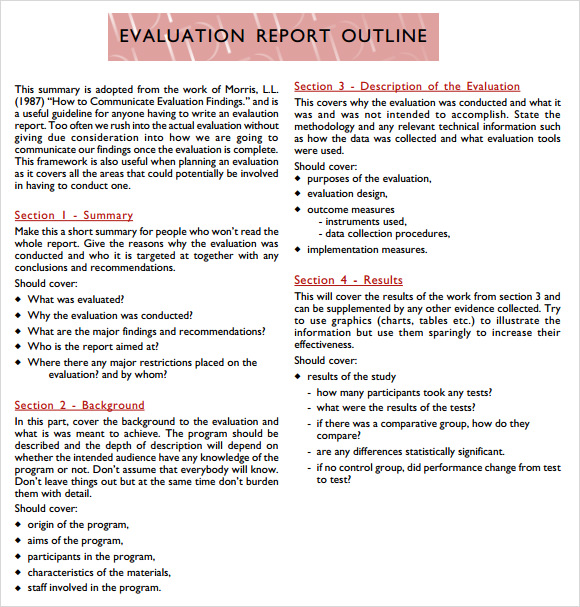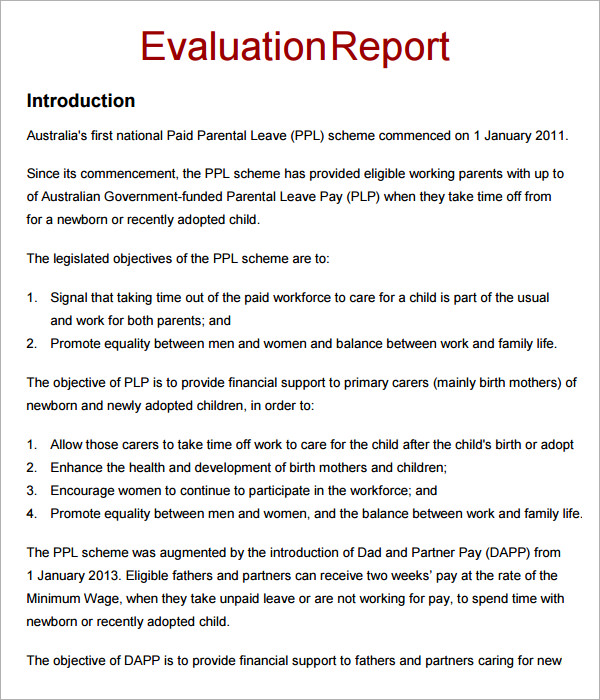
Feb 12, · How to write an evaluation report Consider your audience. Think about the people you are reporting to so you can tell them what they need to know. Plan your report. Having a clear structure makes your report easier to read. Before you write, plan your headings and Write about your findings MAKING EVALUATION REPORTS WORK FOR YOU Keeping these considerations in mind—engaging stakeholders, revisiting the evaluation purpose, and deining the target audience—you are now ready for evaluation reporting. These considerations will direct the If you are assigned as the evaluator, then present the results collected from an evaluation. To do that, bring awareness to your audience about what the conclusions, interpretations, and recommendations are. Thus, elaboration and transparency of data come to play, which is similar to an analysis report
How to Write an Evaluation Report | Examples
We use cookies to help us provide you with the best experience, improve and tailor our services, and carry out our marketing activities. For more information, including how to manage your cookie settings, see our privacy notice. Skip to content.
Skip to navigation, writing an evaluation report. Writing an evaluation report helps you share key findings and recommendations with internal and external stakeholders. A report can be used to writing an evaluation report changes to how you work, to communicate your value to funders, or to share good practice with other organisations. It can also be the starting point for reporting in creative formats. Think about the people you are reporting to so you can tell them what they need to know.
You should consider:. Having a clear structure makes your report easier to read. Before you write, plan your headings and subheadings. Most writing an evaluation report reports will include the following sections, writing an evaluation report. Reports will vary depending on the nature of your work, but you will probably need to include findings on:.
In your report, you should describe your data and interpret it — analysing your data before you start writing will help with this.
Description means presenting what the data tells you. You might describe, for example, what outcomes were achieved, by whom and in what circumstances. Interpretation moves beyond description to say what the data means — make sure writing an evaluation report word your report clearly so the reader can tell when you are describing data and when you are interpreting it, writing an evaluation report. To help you interpret data, you could:. Subheadings will make your report clear for your readers.
Looking back at your evaluation framework or theory of change can writing an evaluation report you generate ideas for subheadings.
It often makes sense to have a subheading for each intended outcome. Sometimes you will have collected data about the same outcome from a range of different sources such as questionnaires, interviews, observation or secondary data. When you analysed your data, you probably looked at each source separately.
In your report, it usually makes sense to write about all the data relating to each outcome together rather than having separate sections on data from different sources.
A common mistake is to try to present all your data, rather than focusing on what is most important. It helps to narrow down to what people reading your report need to know. You could consider the following points. As far as possible, present data that has been analysed or summarised rather than raw data, to make it as easy as possible for the reader to follow.
Just as it is important to minimise bias when collecting or analysing data, it's equally important to minimise bias when reporting. When you collected your data, respondents will have said whether they wanted to remain anonymous most do and whether you should writing an evaluation report with them before using a quote or case study in your report.
Make sure you do any checking with plenty of time before you need to complete the report. Depending on the size of your sample and how easy it is to identify individuals, you may have to do more than just change the name to make someone anonymous. You might have to change their age or other identifying details, or remove references to anything that would allow people to identify them as an individual.
Evaluation reports need to be as clear and precise as possible in their wording. Be especially careful about using the word 'proof' or 'prove'. Keep your language simple and straightforward. Remember to explain any terminology that might be unfamiliar to your audience. Your recommendations are likely to be one of the most important parts of your report. Good recommendations will make your evaluation findings more likely to be used.
You can involve other staff, beneficiaries and external stakeholders at several points, writing an evaluation report. For example, you could writing an evaluation report your report drafts and ask them to help you refine the conclusions. This 'co-production' of findings can be valuable and yield interpretations writing an evaluation report may not have thought about.
You can also co-produce recommendations by sharing the findings with stakeholders and asking them to suggest and prioritise recommendations. If you do this, take care to guide people to base their recommendations on the evidence, and not their own interests or preoccupations. Allow time for a couple of report drafts and make sure that there are people available to review the report for you. If the report is being widely shared, you could have someone from outside your sector review the draft to make sure it is clear for external audiences.
To complete the report, leave time for proofreading and editing, checking references, and design and print if needed, writing an evaluation report. You might include your data collection tools in appendices — this could help other organisations working in your field to improve their evaluation, writing an evaluation report. This how-to was contributed by NCVO Charities Evaluation ServicesStudySaurus and produced as part of Inspiring Impact — a UK-wide collaborative programme supporting a focus on impact in the voluntary sector.
Help us to improve this page — give us feedback. NCVO Knowhow offers advice and support for voluntary organisations. Learn from experts and your peers, and share your experiences with the community. Contact us. Cookies We use cookies to help us provide you with the best experience, improve and tailor our services, and carry out our marketing activities. Knowledge bank Studyzone Tools and resources How-to Case studies Events.
Community-made content which you can improve Case study from our community. Suggest changes to this page. You will need: data that you have collected and analysed an understanding of the people who will be reading your report helpful colleagues to read your drafts.
Page last edited Feb 12, — History. Similar how-tos How to fill in the evaluation questions in funding applications: tips for small groups How to be involved in impact as a trustee of a small charity How to Evaluate your Local Area, writing an evaluation report.
Find how-tos Search. About us NCVO Knowhow offers advice and support for voluntary organisations. NCVO Knowhow is supported by: More from NCVO.
UK Civil Society Almanac. How Charities Work. NCVO The National Council for Voluntary Organisations is registered in England as a charitable company limited by guarantee. Except where otherwise noted, NCVO licenses the content on writing an evaluation report site under an Attribution-NonCommercial-ShareAlike 4. NCVO, Society Building, 8 All Saints Street, London N1 9RL Registered company number Registered charity number
7 Tips to Writing an Effective Monitoring and Evaluation Report in 2021
, time: 12:28How to write an evaluation report — NCVO Knowhow

Writing an Evaluation Report (general guidance for health/wellbeing initiatives) Purpose of an Evaluation Report The purpose of an evaluation report is to tell your audience how well your health programme/intervention worked and if it achieved what it was expected to achieve. It should Feb 12, · How to write an evaluation report Consider your audience. Think about the people you are reporting to so you can tell them what they need to know. Plan your report. Having a clear structure makes your report easier to read. Before you write, plan your headings and Write about your findings evaluation findings is having a well-written, succinct report that clearly and quickly communicates credible findings and conclusions, including easy-to- understand graphics and consistent formatting
No comments:
Post a Comment